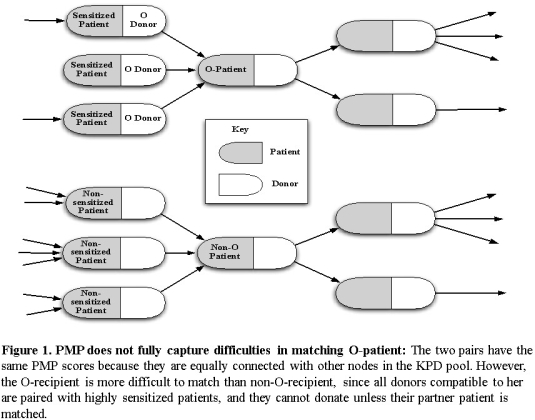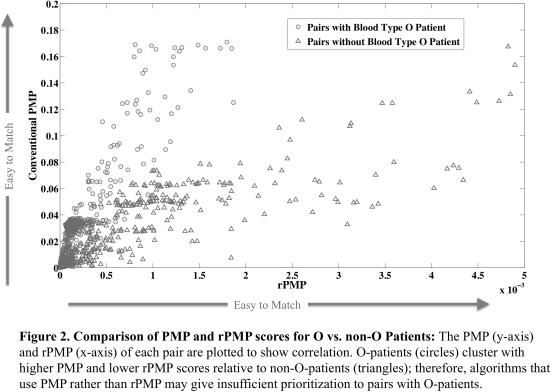Paired Match Power and Challenges for O-Patients in Kidney Paired Donation
W. Liu, M. Melcher.
Stanford University, Stanford, CA.
Meeting: 2015 American Transplant Congress
Abstract number: B168
Keywords: Donation, Donors, Kidney transplantation, unrelated
Session Information
Session Name: Poster Session B: Living Donor Issues 1
Session Type: Poster Session
Date: Sunday, May 3, 2015
Session Time: 5:30pm-6:30pm
 Presentation Time: 5:30pm-6:30pm
Presentation Time: 5:30pm-6:30pm
Location: Exhibit Hall E
Introduction: In kidney paired donation (KPD), Paired Match Power (PMP), defined as Probability{Donor Compatible}×Probability{Patient Compatible}, can be used to prioritize difficult to match pairs. However, it does not fully account for the difficulty of matching of O-recipients because a pair's PMP is determined by the number of compatible donors and recipients for it, while ignoring abilities of these donors and recipients to find matches themselves (Fig 1). We hypothesize that a recursive calculation taking into account this difficulty propagated through the pool would give higher priority to O-recipients for more equitable priority assignment.

Method: Inspired by a web page ranking algorithm, PageRank (Page & Brin. et al., Technical Report, Stanford. 1999), the recursive PMP (rPMP) was developed to account for the added difficulty of finding matches for pairs only compatible with other difficult-to-match pairs. We compare the calculated PMPs and rPMPs within a cohort of 1151 candidate-donor pairs in the National Kidney Registry (NKR).
Results: rPMP and the existing PMP measures have a correlation coefficient of 0.73 in the cohort.However, the median priority rank order based on existing PMP is 83 positions lower than with rPMP since PMP underestimates the challenge for O-patients compared to non- O-patients (Fig 2).

Conclusion: The rPMP and PMP both capture the number of compatible donors and recipients for each pair. However, rPMP is additionally able to capture the abilities of the connected partners of these donors and recipients to match others which is required for a chain. Therefore, current use of PMP underestimates the challenges facing the O-patients, who can only match O-donors, usually only present in a KPD pool because they come with a highly sensitized, difficult-to-match partner. The addition of un-sensitized patients with O donors to the pool should mitigate the disadvantage faced by O-recipients.
To cite this abstract in AMA style:
Liu W, Melcher M. Paired Match Power and Challenges for O-Patients in Kidney Paired Donation [abstract]. Am J Transplant. 2015; 15 (suppl 3). https://atcmeetingabstracts.com/abstract/paired-match-power-and-challenges-for-o-patients-in-kidney-paired-donation/. Accessed February 23, 2026.« Back to 2015 American Transplant Congress
